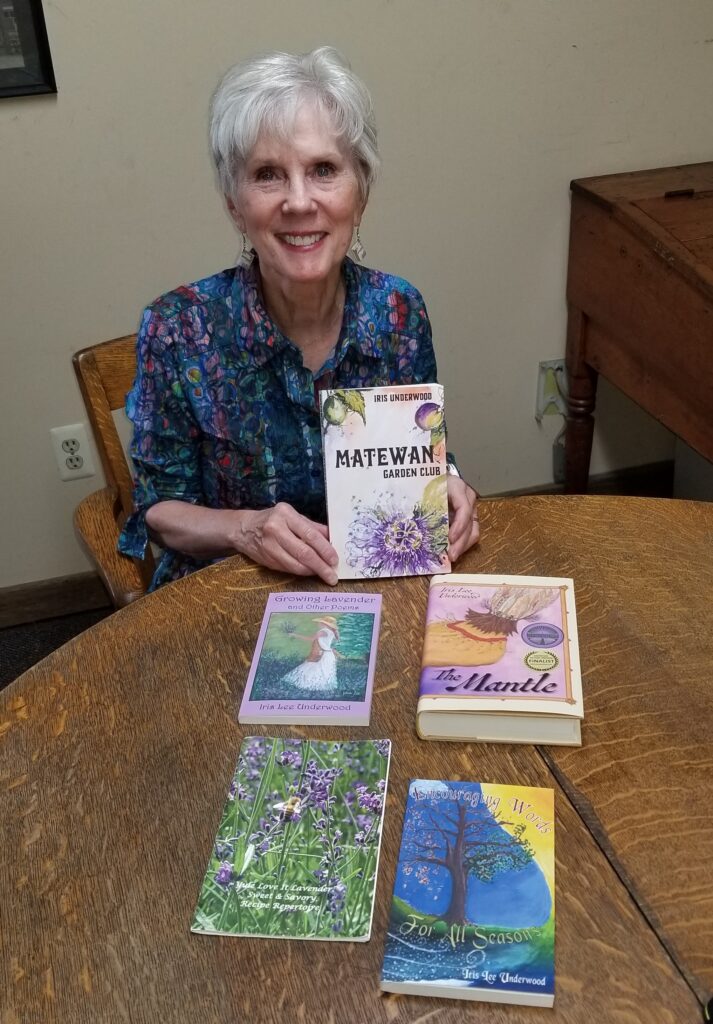
Matewan Garden Club is a tale of 3 generations
By Don Rush
Iris Underwood sees things. She has a vision, follows her instincts and she makes her visions come true. Her latest vision to reality is her fifth book, Matewan Garden Club.
“This is my fantasy about the little, burnt out coal mining town I was born in, in 1949,” Underwood, 74, said. “Matewan town in West Virginia is very special to me. Mom and Dad moved up to Detroit in 1954. As kids, I hated Detroit. I hated Michigan. I wanted to live in Kentucky with my relatives and all my cousins. Every summer we would go back south, but we never made it back to Matewan. We’d drive through it, but not stop. We’d go to Granny’s in Peter Creek and we’d stay there.”
The Matewan Garden Club is about that little burnt out coal town – which is right in the heart of the infamous Hatfield and McCoy feud territory. “In town, for all my life the seed store is a two-story building that was never painted and I had empathy for it because it looked like no one cared for it and it was going to fall. So, lo-and-behold one of my McCoy cousins ended up buying the seed store and some of the nicer brick homes next to it. From then I was able to learn a little of the history and several summers ago, for the first time in my life I was able to get into the seed store. My cousin gave me a tour, from the top where the Masons met to the basement where the mortuary was, it was once a funeral home. But, what struck me was that in the main building there are two huge windows and tall double doors. When you walk in to the right there’s an oak counter that goes on forever with a glass dome over it and instantly I had a vision of what business was conducted there all those years ago. Behind the domed counter were some shelves. On the top shelf I found a magazine that said Matewan Garden Club and a bolt of lightning came from that. I thought, ‘this burnt out town once had a garden club?’
“It takes a lot of determined women with vision to support something like that. The vitality and vision they had were amazing. Matewan was a vital town. I learned it had a women’s club and I was able to meet one of the women’s son who had pictures of the club. His mother was the manager of the Matewan National Bank for 27 years.”
After learning more history of the town, which she says is now in a revival because of its connection with the Hatfields and McCoys, she let her imagination go. In 15 months of writing, re-writing, proofing and editing the 245 page fiction book was released last weekend at a garden party in her lavender farm in Addison Township.
According to the book’s back cover, “Matewan Garden Club spans three generations and a multitude of dreams amongst the tight-knit West Virginia immigrant coal camps and towns along Tug Fork: Matewan, Williamson, Blackberry City, Red Jacket, Thacker Holler, and countless hollers in between. Like Tug River’s many tributaries, these communities converge in Matewan to build enduring love amid the business of native flora and fauna—seedlings that bloom in the hard times of the Bolshevik Revolution, impoverished post–WWI Europe, Depression-era America, and beyond.”
Underwood and her husband Mel have been married for 53 years, they have two daughters Kelly and Ruth and have lived in Addison Township for 34 years. She started writing a column for the Oxford Leader in the 1990s called “Encouraging Words.” From there, she started writing for other area newspapers and eventually, writing books, working a lavender farm and giving lectures.
She has three upcoming events about her new book; This Friday starting at 2 p.m., in the Oxford Library she will discuss the making of Matewan Garden Club; on July 18, starting at 6 p.m., in the Almont Public Library, she will show how her novel is about forgiveness and community; and on July 20, from 4 to 6 p.m. at the Lapeer Center for the Arts she and local artists Ruth Forman and Linda Hodges will dive into the Art and Story of Matewan Garden Club.

Leave a Reply